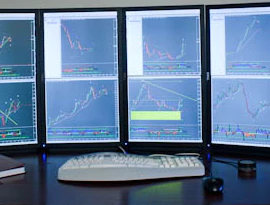|
WHAT YOU NEED TO KNOW ABOUT OVERCLOCKING

You may see other trading computer companies overclocking their systems simply to command a HIGHER price! There is NO reason on earth for a trading computer to be overclocked. There is NO advantage of overclocking (other than bragging rights) but several disadvantages. Overclocking is the process where you tell the hardware to run at speeds above their stock, or default, manufactured rating. For a CPU, that might mean increasing its core multiplier (a CPU’s speed is always its base clock times the core multiplier). For graphics cards, that could mean increasing the core, memory and boost clock speeds to get better performance in games.
1. The biggest disadvantage of overclocking is reduced lifespan of hardware components. Overclocking increases voltage and thus, increases heat generation. An increase in heat can gradually damage the specific components of CPUs, GPUs, RAMs, and motherboard.
2. Instability of the entire computer or device can also result from the gradually diminishing hardware integrity due to heat damage. Pushing the limits of hardware components also means losing stability. This instability is noticeable through system crashes or application crashes. Overclocked computers have a water cooled system. Those have a very high failure rate of the water cooling pump rendering the system to auto shut down due to high temperatures.
3. Without a proper cooling system, overclocking will certainly result in overheating. Note that pushing the limits too far without using an appropriate cooling system can immediately result in system failure due to overheating. This is another risk of overclocking.
4. The increased heat generated from the overclocked hardware component can also damage other hardware components within a system. Some users use cooling systems that pose risks to the systems. Examples of these are water or liquid cooling or nitrogen cooling that can result in leaks and short circuits.
5. Another disadvantage of overclocking is noise. Because overclocked devices such as computers need a better cooling system, high-performance fans tend to run at maximum speed that can produce noise as loud as 50 decibels.
6. Increasing clock rates can consume more power. Coupled with the need to use high-performance fans or cooling systems, overclocking increases power consumption and thus, reduces the energy efficiency of a computer or device.
7. Overclocking may be incompatible with software configuration and some processes can produce software bugs. Some overclocking process might also render a computer incompatible with future software configurations from operation system upgrades. |